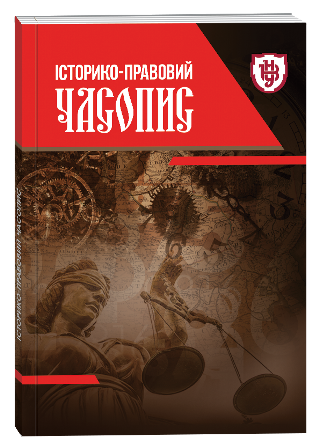THE CONCEPT OF SOCIAL PROGRESS IN UKRAINIAN LEGAL THOUGHT (THROUGH THE PRISM OF THE WORKS OF IVAN FRANKO AND MYKHAILO DRAHOMANOV): FRAMING OF THE QUESTION
DOI:
https://doi.org/10.32782/2409-4544/2024-2/1Keywords:
evolution, community, liberalism, progress, outlook, societyAbstract
In the second half of the 19th century the majority of Ukrainian scientists, writers and intellectuals (V. B. Antonovych, M. P. Drahomanov, M. M. Kovalevskyi, V. V. Lesevich, I. Y. Franko, etc.) actively began the search of factors and «springs» of historical and legal development in the rational («positive») sphere of human (social) activity. Since objective reality develops according to the patterns specific to progress, social reality, in their opinion, can be properly perceived and evaluated only through the prism of the concept of social progress. Progress is considered as a qualitative characteristic of the social process, which is based on the fact that as a result of development (changes, innovations, mutations, etc.), a social subject can move from lower forms of its existence to higher, more perfect ones (improvement). It is shown that Mykhailo Drahomanov interprets progress in the spirit of the positivist theory of factors, and interprets social progress as a non-linear and contradictory phenomenon. It is emphasized that Drahomanov’s modern philosophy of history becomes possible for him only from the point of view of the theory of progress, the content and purpose of which is to assimilate real life to a certain ideal type. Drahomanov’s theory of social progress is formulated as an unconditional law of unilinear (ascending) unceasing historical development – from lower to higher levels, up to a perfect society. In the work «Paradise and progress» Drahomanov reveals the organic (hence – logical) course of the mental progress of mankind as a guarantee of the social stage – from religious to secular (early modern period) with the simultaneous growth of general legal awareness. Ivan Franko considers social progress as an evolutionary vector of social development with equal fluctuations of both progressive and regressive (but less determining) factors. Despite the thesis replicated in Soviet historiography that Franko’s interpretation of social progress is based on Marxist methodology, modern non-engaged analysis demonstrates his stay in the conceptual framework of Auguste Comte’s positivism, which he actively reinterpreted.
References
Артюх В. О. Тяглість історії й історія тяглості: українська філософсько-історична думка першої половини ХХ століття: монографія. Суми: Триторія, 2024. 394 с.
Архів Михайла Драгоманова. Варшава, 1937. Т. 1 (Листування Київської Старої Громади з М. Драгомановим (1870-1895 рр.)). 445 с. URL: https://diasporiana.org.ua/ideologiya/2260-arhiv-mihayla-dragomanova-t-1-listuvannya-kiyivskoyi-staroyi-gromadi-z-m-dragomanovim-1870-1895-r/ (дата звернення: 08.11.2024).
Бєлов Д. М., Марцеляк М. О. Прогресивістський конституціоналізм Михайла Драгоманова. Науковий вісник Ужгородського національного університету. Серія «Право». 2022. Вип. 74. Ч. 1. С. 59–68.
Бунчук О. Б. Вплив М. Драгоманова на правовий світогляд І. Франка. Юридичний науковий електронний журнал. 2018. № 1. С. 10–13. URL: http://lsej.org.ua/1_2018/3.pdf (дата звернення: 08.11.2024).
Гомілко О. Є. Ідея свободи та прогресу в філософії історії Михайла Драгоманова. Філософські діалоги’2018. Бути людиною (пам’яті Мирослава Поповича): зб. наук. праць. Гол. ред. А. М. Єрмоленко; Інститут філософії імені Г. С. Сковороди. Київ : [б. в.], 2018. Вип. 15–16. С. 192–210.
Городиська Н. Соціальний прогрес в умовах діджиталізації. Збірник тез ІІІ Міжнародної науково-практичної конференції молодих учених та студентів «Філософські виміри техніки» 1-2 грудня 2022 р. Т.: ТНТУ, 2022. С. 39–41.
Грицак Я. Пророк у своїй вітчизні. Франко та його спільнота (1856-1886). Київ: «Критика», 2006. 632 с.
Драгоманов М. П. Переднє слово до «Громади» 1878 року. Вибране («…Мій задум зложити очерк історії цивілізації на Україні»). Упоряд. та авт. іст.-біогр. нарису Р.С. Міщук; приміт. Р.С. Міщука, В.С. Шандри. Київ: Либідь, 1991. С. 276–326.
Драгоманов М. П. Переписка. Зібрав і зладив М. Павлик. Львів: Накладом Укр.-рус. вид. спілки, 1901. Т. 1. 184 с.
Драгоманов М. П. Рай і поступ. Передм. М. І. Павлика. Відень: Наклад і друк партійної друкарні, 1915. 72 с.
Крупницький Б. Д. Михайло Драгоманів і В’ячеслав Липинський (Спроба порівняльної характеристики). Український Літопис. Авґсбурґ. 1946. Ч. 10. С. 1–6.
Лисяк-Рудницький Іван. Історичні есе. Т. 1. Видання 2-е. К.: ДУХ І ЛІТЕРА, 2019. 632 с.
Решетов О. О., Кирильчук В. Т., Стежко З. В. Ідея прогресу в історії філософії. Наукові записки: зб. наук. праць. Кіровоград: КНТУ, 2007. Вип. 8. С. 130–132.
Скворець В. О. Соціальний прогрес як суспільствознача проблема. Гуманітарний вісник ЗДІА. 2011. № 47. С. 123–133.
Ушкалов Л. Чарівність енергії: Михайло Драгоманов. К.: ДУХ І ЛІТЕРА, 2019. 600 с. (Серія: «Постаті культури»).
Франко І. Я. Наука і її взаємини з працюючими класами. Зібр. твор. у 50 т. Т. 45. Філософські праці. К.: «Наукова думка», 1986. 578 с. С. 24–40.
Франко І. Я. Що таке поступ?. Зібр. твор. у 50 т. Т. 45 Філософські праці. К.: «Наукова думка», 1986. 578 с. С. 300–348.
Mroczek Ludwik. Rocznik Naukowo-Dydaktyczny WSP w Krakowie. Studia z dziejów Małopolski w XIX I XX wieku. Krakow. 1992. 336 s.







